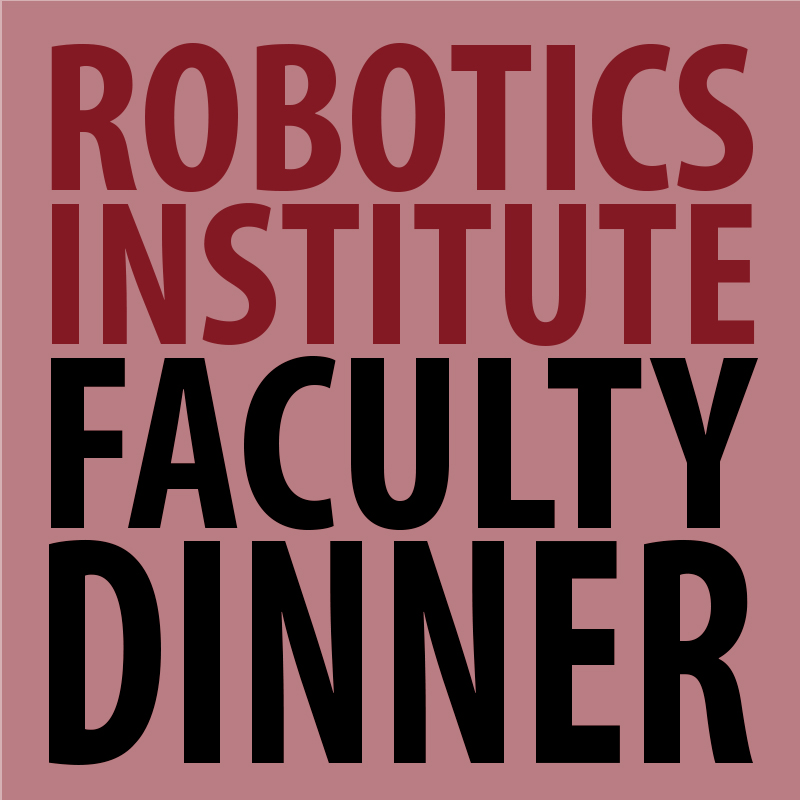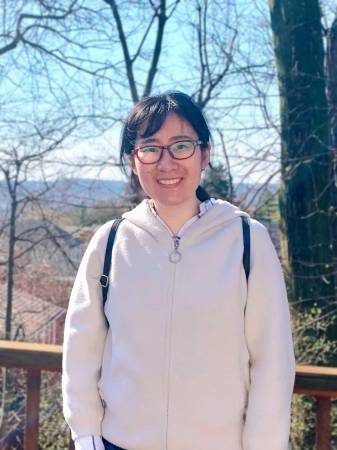RE2 Robotics: from RI spinout to Acquisition
Abstract: It was July 2001. Jorgen Pedersen founded RE2 Robotics. It was supposed to be a temporary venture while he figured out his next career move. But the journey took an unexpected course. RE2 became a leading developer of mobile manipulation systems. Fast forward to 2022, RE2 Robotics exited via an acquisition to Sarcos Technology and [...]
Equivalent Policy Sets for Learning Aligned Models and Abstractions
Abstract: Recent successes in model-based reinforcement learning (MBRL) have demonstrated the enormous value that learned representations of environmental dynamics (i.e., models) can impart to autonomous decision making. While a learned model can never perfectly represent the dynamics of complex environments, models that are accurate in the "right” ways may still be highly useful for decision [...]
Dynamic Route Guidance in Vehicle Networks by Simulating Future Traffic Patterns
Abstract: Roadway congestion leads to wasted time and money and environmental damage. Since adding more roadway capacity is often not possible in urban environments, it is becoming more important to use existing road networks more efficiently. Toward this goal, recent research in real-time, schedule-driven intersection control has shown an ability to significantly reduce the delays [...]
Enabling Self-sufficient Robot Learning
Abstract: Autonomous exploration and data-efficient learning are important ingredients for helping machine learning handle the complexity and variety of real-world interactions. In this talk, I will describe methods that provide these ingredients and serve as building blocks for enabling self-sufficient robot learning. First, I will outline a family of methods that facilitate active global exploration. [...]
Adaptive Robotic Assistance through Observations of Human Behavior
Abstract: Assistive robots should take actions that support people's goals. This is especially true as robots enter into environments where personal agency is paramount, such as a person's home. Home environments have a wide variety of "optimal' solutions that depend on personal preference, making it difficult for a robot to know the goal it should [...]
Perceiving Objects and Interactions in 3D
Abstract: We observe and interact with myriad of objects in our everyday lives, from cups and bottles to hammers and tennis rackets. In this talk, I will outline our group’s efforts towards understanding these objects and our everyday interactions with them in 3D. I will first focus on scaling 3D prediction for isolated objects across [...]
Understanding the Physical World from Images
If I show you a photo of a place you have never been to, you can easily imagine what you could do in that picture. Your understanding goes from the surfaces you see to the ones you know are there but cannot see, and can even include reasoning about how interaction would change the scene. [...]
Beyond Pick-and-Place: Towards Dynamic and Contact-rich Motor Skills with Reinforcement Learning
Abstract: Interactions with the physical world are at the core of robotics. However, robotics research, especially in manipulation, has been mainly focused on tasks with limited interactions with the physical world such as pick-and-place or pushing objects on the table top. These interactions are often quasi-static, have predefined or limited sequence of contact events and [...]
How Computer Vision Helps – from Research to Scale
Abstract: Vasudevan (Vasu) Sundarababu, SVP and Head of Digital Engineering, will cover the topic: ‘How Computer Vision Helps – from Research to Scale’. During his time, Vasu will explore how Computer Vision technology can be leveraged in-market today, the key projects he is currently leading that leverage CV, and the end-to-end lifecycle of a CV initiative - [...]
Adaptive-Anytime Planning and Mapping for Multi-Robot Exploration in Large Environments
Abstract: Robotic systems are being leveraged to explore environments too hazardous for humans to enter. Robot sensing, compute, and kinodynamic (SCK) capabilities are inextricably tied to the size, weight, and power (SWaP) constraints of the vehicle. When designing a robot team for exploration, the diversity and types of robots used must be carefully considered because [...]
Neural Radiance Fields with LiDAR Maps
Abstract: Maps, as our prior understanding of the environment, play an essential role for many modern robotic applications. The design of maps, in fact, is a non-trivial art of balance between storage and richness. In this thesis, we explored map compression for image-to-LiDAR registration, LiDAR-to-LiDAR map registration, and image-to-SfM map registration, and finally, inspired by [...]
Enabling Data-Efficient Real-World Model-Based Manipulation by Estimating Preconditions for Inaccurate Models
Abstract: This thesis explores estimating and reasoning about model deviation in robot learning for manipulation to improve data efficiency and reliability to enable real-robot manipulation in a world where models are inaccurate but still useful. Existing strategies are presented for improving planning robustness with low amounts of real-world data by an empirically estimated model precondition to guide [...]
Robust Adaptive Reinforcement Learning for Safety Critical Applications via Curricular Learning
Abstract: Reinforcement Learning (RL) presents great promises for autonomous agents. However, when using robots in a safety critical domain, a system has to be robust enough to be deployed in real life. For example, the robot should be able to perform across different scenarios it will encounter. The robot should avoid entering undesirable and irreversible [...]
Motion Matters in the Metaverse
Abstract: Abstract: In the early 1970s, Psychologists investigated biological motion perception by attaching point-lights to the joints of the human body, known as ‘point light walkers’. These early experiments showed biological motion perception to be an extreme example of sophisticated pattern analysis in the brain, capable of easily differentiating human motions with reduced motion cues. Further [...]
MSR Thesis Talk: Yichen Li
Title: Simulation-guided Design for Vision-based Tactile Sensing on a Soft Robot Finger Abstract: Soft pneumatic robot manipulators have garnered widespread interest due to their compliance and flexibility, which enable soft, non-destructive grasping and strong adaptability to complex working environments. Tactile sensing is crucial for these manipulators to provide real-time contact information for control and manipulation. [...]
Controllable Visual-Tactile Synthesis
Abstract: Deep generative models have various content creation applications such as graphic design, e-commerce, and virtual Try-on. However, current works mainly focus on synthesizing realistic visual outputs, often ignoring other sensory modalities, such as touch, which limits physical interaction with users. The main challenges for multi-modal synthesis lie in the significant scale discrepancy between vision [...]
Geometry Processing and Differential Geometry
Abstract: Basic representations for three-dimensional geometry have a profound effect on what can be achieved downstream, in a variety of disciplines (physical simulation, computational design, geometric learning, etc.). In this talk I will discuss recent efforts in our group to revisit fundamental choices in the way we represent digital geometry, and solve geometric equations. The guiding [...]
Perceiving Particles Inside a Container using Dynamic Touch Sensing
Abstract: Dynamic touch sensing has shown potential for multiple tasks. In this talk, I will present how we utilize dynamic touch sensing to perceive particles inside a container with two tasks: classification of the particles inside a container and property estimation of the particles inside a container. First, we try to recognize what is inside [...]
Towards Photorealistic Dynamic Capture and Animation of Human Hair and Head
Abstract: Realistic human avatars play a key role in immersive virtual telepresence. To reach a high level of realism, a human avatar needs to faithfully reflect human appearance. A human avatar should also be drivable and express natural motions. Existing works have made significant progress on building drivable realistic face avatars, but they rarely include [...]
What do generative models know about geometry and illumination?
Abstract: Generative models can produce compelling pictures of realistic scenes. Objects are in sensible places, surfaces have rich textures, illumination effects appear accurate, and the models are controllable. These models, such as StyleGAN, can also generate semantically meaningful edits of scenes by modifying internal parameters. But do these models manipulate a purely abstract representation of the [...]
Life as a Professor Seminar
Have you ever wondered what life is like as a professor? What do professors do on a daily basis? What makes the faculty career challenging and rewarding? Maybe you have even thought about becoming a faculty member yourself? Join us on March 22nd from 2:00 - 3:30 PM, where a panel of CMU faculty will [...]
Carnegie Mellon University
System Identification and Control of Multiagent Systems Through Interactions
Abstract: This thesis investigates the problem of inferring the underlying dynamic model of individual agents of a multiagent system (MAS) and using these models to shape the MAS's behavior using robots extrinsic to the MAS. We investigate (a) how an observer can infer the latent task and inter-agent interaction constraints from the agents' motion and [...]
Examining the Role of Adaptation in Human-Robot Collaboration
Abstract: Human and AI partners increasingly need to work together to perform tasks as a team. In order to act effectively as teammates, collaborative AI should reason about how their behaviors interplay with the strategies and skills of human team members as they coordinate on achieving joint goals. This talk will discuss a formalism for [...]
A Multi-view Synthetic and Real-world Human Activity Recognition Dataset
Abstract: Advancements in Human Activity Recognition (HAR) partially relies on the creation of datasets that cover a broad range of activities under various conditions. Unfortunately, obtaining and labeling datasets containing human activity is complex, laborious, and costly. One way to mitigate these difficulties with sufficient generality to provide robust activity recognition on unseen data is [...]
RI Faculty Business Meeting
Meeting for RI Faculty. Discussions include various department topics, policies, and procedures. Generally meets weekly.
A Constructivist’s Guide to Robot Learning
Over the last decade, a variety of paradigms have sought to teach robots complex and dexterous behaviors in real-world environments. On one end of the spectrum we have nativist approaches that bake in fundamental human knowledge through physics models, simulators and knowledge graphs. While on the other end of the spectrum we have tabula-rasa approaches [...]
Robot Learning by Understanding Egocentric Videos
Abstract: True gains of machine learning in AI sub-fields such as computer vision and natural language processing have come about from the use of large-scale diverse datasets for learning. In this talk, I will discuss if and how we can leverage large-scale diverse data in the form of egocentric videos (first-person videos of humans conducting [...]
Eye Gaze for Intelligent Driving
Abstract: Intelligent vehicles have been proposed as one path to increasing vehicular safety and reduce on-road crashes. Driving intelligence has taken many forms, ranging from simple blind spot occupancy or forward collision warnings to lane keeping and all the way to full driving autonomy in certain situations. Primarily, these methods are outward-facing and operate on [...]
Dense 3D Representation Learning for Geometric Reasoning in Manipulation Tasks
Abstract: When solving a manipulation task like "put away the groceries" in real environments, robots must understand what *can* happen in these environments, as well as what *should* happen in order to accomplish the task. This knowledge can enable downstream robot policies to directly reason about which actions they should execute, and rule out behaviors [...]
RI Faculty Business Meeting
Meeting for RI Faculty. Discussions include various department topics, policies, and procedures. Generally meets weekly.
Next-Generation Robot Perception: Hierarchical Representations, Certifiable Algorithms, and Self-Supervised Learning
Spatial perception —the robot’s ability to sense and understand the surrounding environment— is a key enabler for robot navigation, manipulation, and human-robot interaction. Recent advances in perception algorithms and systems have enabled robots to create large-scale geometric maps of unknown environments and detect objects of interest. Despite these advances, a large gap still separates robot [...]
Autonomous mobility in Mars exploration: recent achievements and future prospects
Abstract: This talk will summarize key recent advances in autonomous surface and aerial mobility for Mars exploration, then discuss potential future missions and technology needs for Mars and other planetary bodies. Among recent advances, the Perseverance rover that is now operating on Mars includes new autonomous navigation capability that dramatically increases its traverse speed over [...]
Passive Coupling in Robot Swarms
Abstract: In unstructured environments, ant colonies demonstrate remarkable abilities to adaptively form functional structures in response to various obstacles, such as stairs, gaps, and holes. Drawing inspiration from these creatures, robot swarms can collectively exhibit complex behaviors and achieve tasks that individual robots cannot accomplish. Existing modular robot platforms that employ dynamic coupling and decoupling [...]
RI Faculty Business Meeting
Meeting for RI Faculty. Discussions include various department topics, policies, and procedures. Generally meets weekly.
Structures and Environments for Generalist Agents
Abstract: We are entering an era of highly general AI, enabled by supervised models of the Internet. However, it remains an open question how intelligence emerged in the first place, before there was an Internet to imitate. Understanding the emergence of skillful behavior, without expert data to imitate, has been a longstanding goal of reinforcement [...]
Learning novel objects during robot exploration via human-informed few-shot detection
Abstract: Autonomous mobile robots exploring in unfamiliar environments often need to detect target objects during exploration. Most prevalent approach is to use conventional object detection models, by training the object detector on large abundant image-annotation dataset, with a fixed and predefined categories of objects, and in advance of robot deployment. However, it lacks the capability [...]
Learning to Perceive and Predict Everyday Interactions
Abstract: This thesis aims to develop a computer vision system that can understand everyday human interactions with rich spatial information. Such systems can benefit VR/AR to perceive the reality and modify its virtual twin, and robotics to learn manipulation by watching human. Previous methods have been limited to constrained lab environment or pre-selected objects with [...]
Faculty Candidate: Wenshan Wang
Title: Towards General Autonomy: Learning from Simulation, Interaction, and Demonstration Abstract: Today's autonomous systems are still brittle in challenging environments or rely on designers to anticipate all possible scenarios to respond appropriately. On the other hand, leveraging machine learning techniques, robot systems are trained in simulation or the real world for various tasks. Due to [...]
From Videos to 4D Worlds and Beyond
Abstract: Abstract: The world underlying images and videos is 3-dimensional and dynamic, i.e. 4D, with people interacting with each other, objects, and the underlying scene. Even in videos of a static scene, there is always the camera moving about in the 4D world. Accurately recovering this information is essential for building systems that can reason [...]

































